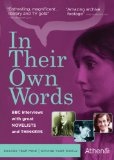| Reviews & Columns |
|
Reviews DVD TV on DVD Blu-ray 4K UHD International DVDs In Theaters Reviews by Studio Video Games Features Collector Series DVDs Easter Egg Database Interviews DVD Talk Radio Feature Articles Columns Anime Talk DVD Savant Horror DVDs The M.O.D. Squad Art House HD Talk Silent DVD
|
DVD Talk Forum |
|
|
| Resources |
|
DVD Price Search Customer Service #'s RCE Info Links |
|
Columns
|
|
|
In Their Own Words
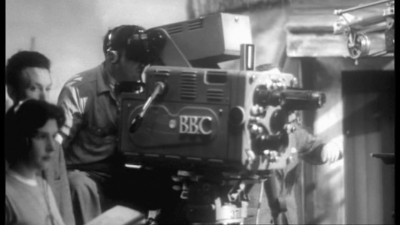
If you are, like me, an Anglophile and wannabe intellectual whose most idle, self-indulgent, and far-fetched fantasies have sometimes involved hanging out with Ian McEwan or Salman Rushdie, or holding one's own in a one-on-one conversation with Germaine Greer, then Athena Learning's new DVD box set presentation of the BBC retrospective-documentary series In Their Own Words is pure catnip. Spanning the entire 20th century through the eyes (and ears) of BBC documentaries and interviews, with three of its six episodes devoted to British novelists from 1919 to 1990 and the other three spanning "great thinkers" from Freud to Edward Said, it's a recap of a century that was blessed (and, sometimes, cursed) with a dizzying array of philosophical, aesthetic, cultural, social, political, and intellectual shifts, depressions and wars and liberation movements, with almost as varied a succession of intellectuals, theorists, and writers there to either spearhead or refract them back toward the public. But what makes In Their Own Words so vital isn't its insider-ness or preaching to the choir (i.e., people like me, who can't get enough of this kind of thing), of which it actually has fairly little; it's more its spirit of outreach to those who may not yet have had the opportunity to realize how engaging and engrossing matters of history, culture, art, and politics can be, especially when their teeming, dynamic interrelation is as well and succinctly introduced and explored as it is here.
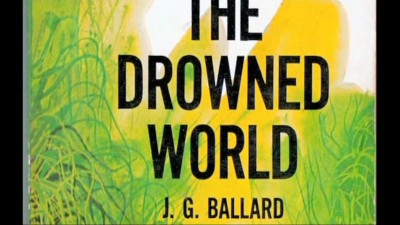
The first disc serves as yet another testimonial--after the Booker Prize hoopla heard 'round the world annually when the committee gives their award to the best Anglophone novel of the year--to the fact that someone in England still, miraculously (or so it would seem to those of us across the pond), cares deeply and publicly about The Art of the Novel, and still confidently believes in its relevance. The three episodes of this first half of the series trace the British novel from its dark but vital post-WWI surge of modernism all the way up through the medium's latter-day multiculturalism, a still-running moment after empire and colonialism were done when new waves of former colonial subjects (some of whom were also marvelous novelists) reminded the little island that it was part of a much bigger world. The first episode, "Among the Ruins: 1919-1939," goes into some depth on the Virginia Woolf-encircling Bloomsbury Group, which also encompassed some of the other great novelists of the period, such as E.M. Forster (A Passage to India, Howards End) and Evelyn Waugh (Vile Bodies, aka Bright Young Things). (Woolf's rarely-recorded voice is also heard in an audio clip from an early radio broadcast.) On the lighter side, comic/satirical novelist P.G. Wodehouse and author of hundreds of escapist romances Barbara Cartland came to prominence in this period, and both are shown in full feisty, sparkling personality through both early and later interviews. The episode ends with highlights from an eccentric but fascinating '50s BBC documentary on Graham Greene (Brighton Rock, The End of the Affair), who allowed BBC cameras to follow along with him on a Continental train ride, with full audio-recording privileges, but refused to show his face. Interspersed with that archival audio/early video footage are clips from cheap, uncinematic, but faithful BBC-TV adaptations, including Greene's Brighton Rock and George Orwell's 1984, as well as abundant sharp, frequently witty commentary recorded for the program with British literary critics of our day. The same format is then followed throughout the next two episodes, "The Age of Anxiety, 1945-1969" (with Kingsley Amis, William Golding, J.R.R. Tolkien, Anthony Burgess, Doris Lessing, J.G. Ballard, and Iris Murdoch, among others) and "Nothing Sacred, 1970-1990" (with Martin Amis, Salman Rushdie, Hanif Kureishi, Fay Weldon, John Le Carré, and Ian McEwan, etc.), with archived BBC-TV appearances by all the authors brought back out for us to see, as well as some surprisingly lively footage of the annual Booker Prize award dinner. (The fact that this award is transformed into the "literary Oscars" and broadcast on the BBC, while any American equivalent of such a thing is relegated to C-SPAN's Book-TV, is yet another marker of the much higher value still placed on the novel across the Atlantic.)
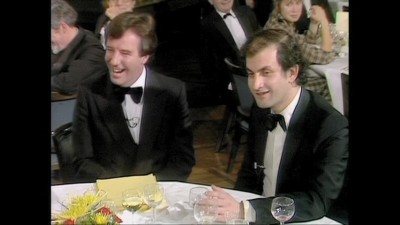
The well-enunciated, smooth voice of narrator Rebecca Front is our guide throughout all three initial episodes of In Their Own Words, tying the segments together and smoothing transitions from one author to the next as she reads well-written context and details along the way, ensuring that we always have our bearings, but without oversimplifications or overexplaining. She does the same during three episodes on disc two, which parallel the first disc's exploration of some of the 20th century's greatest fiction writers with a thematically rather than chronologically ordered rundown of some of the greatest, most revolutionary thinkers of the time. The first episode, "Human, All Too Human," focuses on psychological, sociological, and behavioral scientists and writers from Freud (who sought refuge from the Nazis in England in the late 30s and whose voice and image are seen/heard here in some extraordinary, rare clips) to B.F. Skinner, to Dr. Benjamin Spock, to Desmond Morris's controversial shrinking of the supposed space dividing human and animal behaviors, to behavioral psychologist Stanley Milgrams' shocking discoveries of human beings' capacities for cruelty, the mental illness-redefining insights and progressive stances of Scottish psychiatrist R.D. Laing, and the revolutionary and inspiring primate research of Margaret Mead and Jane Goodall, all with copious footage from BBC appearances by all of those figures.
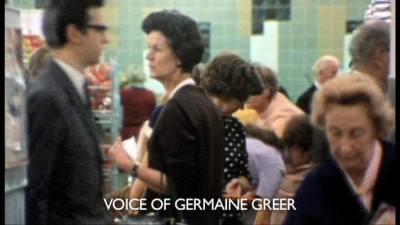
Episode two, "The Grand Experiment," focuses on economics and politics, with segments on early, New Deal-presaging economist John Maynard Keynes and his later right-wing, Margaret Thatcher-inspiring renouncer Milton Friedman (the battle between whose economic philosophies we feel in our paychecks and pocketbooks now as much as ever) bookending pieces on the Labour Party's socialist hero of the 1950s, Sir William Beveridge; Freud's fellow German refugee Herbert Marcuse, an unlikely godfather to the radical left of the '60s; Marxist activist/author Tariq Ali (who is also on hand in a contemporary interview for commentary); and prickly, deep-thinking feminist icon Germaine Greer. The final third of the second disc, "The Culture Wars," traces said wars, British-style, from the spread of high culture to the masses through the BBC as envisioned by its founder, John Reith, to the reflexive reaction against such popularization by eminent Oxford literary critic F.R. Leavis, to the subsequent heated debate between Leavis and fellow academic C.P. Snow over what culture and literature are and are meant to be. After World War II, taking their cue from Welsh Oxford professor Raymond Williams and provincial academic Richard Hoggart, the BBC slowly undertook a defrosting of its approach to culture, leading eventually to a somewhat bemused embrace of visiting North Americans like Susan Sontag and Marshall McLuhan. By the end of the episode, a long-running back-and-forth among elites over "high" vs. "low" culture has given way to an influx of new energies and broader, more critical perspectives from the cultures of former British colonial subjects like Palestine-born Edward Said and Jamaican-born Stuart Hall.
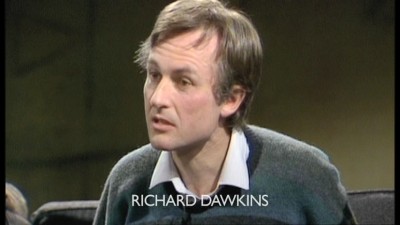
It all goes by fast, not so much as a blur as a well-calibrated overview of the century's life of the mind as it looked from and happened in the British Isles, and as it was recorded and transmitted for those nations' citizens by their public-service, "socialist" broadcast media, the BBC. That demarcation of what would and would not be included might have been arbitrary, but it's very useful for giving a more precise shape to what we're watching, making its limitations explicit and neutralizing them: The omission of, say, F. Scott Fitzgerald, Saul Bellow, Hannah Arendt, and James Baldwin means not that they were overlooked, but only that their paths never happened to cross that of the BBC in a significant way. As the series just barely has time to sufficiently chew what it has bitten off in its allotted six hours, it was not only convenient for the program's producers but also wise to set such a self-limiting boundary for the program. What remains after that selection process is still incredibly far-ranging, incessantly edifying and engaging--a long historical journey taken briskly that leaves you both breathless and invigorated. Considered as a whole (and leaving aside my one complaint about the series--its very canned and corny musical soundtrack that gives us ersatz versions of the popular musical styles of each period under discussion--which becomes easy enough to ignore), it would be difficult to think of a more convincing and optimistic testament than In Their Own Words to the revolutionary power that the broadcast media had in the last century to not only delight, entertain, and ease the workaday stress of the masses in its oft-castigated "boob tube" guise, but also to make widely available the kinds of thinkers and thought, the sorts of provocative and horizon-broadening intellectual discourses, that had hitherto been more or less the exclusive provenance of those with the education and leisure to afford them.
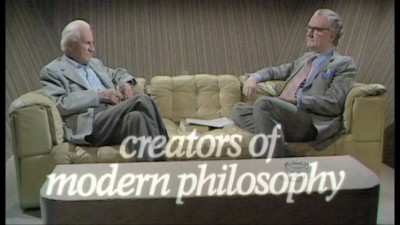
THE DVD:
Visually, the series runs virtually the entire gamut of TV's ever-evolving visual qualities, from the sharp-clear-bright DV of the contemporary interviews to smudgy early and mid-period videotape all the way back to what appears to be film camera/kinoscope technology. It all looks just as it should in this transfer (which is in various aspect ratios, with the primary ratio appearing to be 1.66:1), which is to say not pristine in any way, but with its authentic look (usually subpar by today's HDTV standards) well-preserved for posterity.
Sound:The discs' Dolby Digital 2.0 soundtrack is more than good enough for all the dimensions of sound involved. Most of the series' material was recorded and presented at that level of technological advancement or less, so everything from the programs' narration to the present-day interviews, and going all the way back to that scratchy, preciously rare audio artifact of Virginia Woolf speaking, sounds as good as it possibly can, and always clear enough to make out even through scratches or other distortions and flaws.
Extras:As usual for Athena Learning's DVD releases, the emphasis in the extras isn't so much on the audiovisual as it is on the textual, so while the supplements may not be as lively as we're used to, they are valuable additions that extend the experience by offering additional context and historical-timeline placement for anyone not already familiar with all of the artists and intellectuals covered in the series. Each disc contains brief but fact-filled and thorough-as-possible onscreen-text biography of the principal figures covered in that disc's episodes, and the box includes a 15-page booklet with a short history of the BBC; bios of some of the onscreen talent working at that institution over the years, whom we have seen at work in the programs; a rundown on the Bloomsbury Group; and summations of critical responses to some of the works in question, and the ways in which those responses have in many cases evolved from revulsion to reverence over the years.
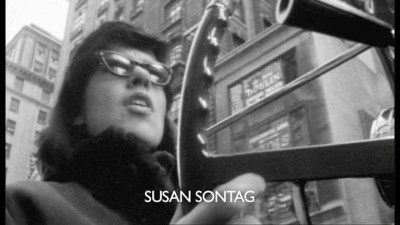
In Their Own Words is a delightful six-hour mini-voyage through the arts and letters of the 20th century. The "mini" should be borne in mind, as the program restricts itself exclusively to writers and thinkers who were in one way or another featured on BBC radio or television, so the UK gets first priority, and North America and Europe (not to mention the rest of the world) will just have to make their own In Their Own Words. There's also a sense of breadth rather than depth; each segment sagely and conscientiously does give us the basics, and the transitions are fairly nicely done, but the portions about figures that really pique your interest will serve as better initiations/spurs to further investigation than actual educations. Still, breadth in this context is not just mitigated by the thoughtful and well-researched quality of each brief overview, but a worthy ambition in itself; you get a bevy of juicy historical, political, social, and cultural tidbits packed tightly into these six episodes, broadening your frame of reference all the while, and the whole thing is given a nicely linear structure for continuity and connection, filling in all kinds of gaps in your knowledge of 20th-century history and culture. It has a serious yet accessible tone that never trivializes but is always entertaining, making the whole affair addictive and diverting enough that after you put it on, you'll most likely find yourself spending the better part of your day with Freud, Woolf, Keynes, Rushdie, Margaret Mead, Benjamin Spock, the Amises, and their ilk, all brought to you by a host of buttoned-down yet eccentric BBC interviewers and mediators. In Their Own Words brings, in a form that is the next-best thing to "in person," a lively menagerie of bright, interesting people to a place they were (for most of us) most unlikely to turn up: our living rooms. With these DVDs, you can invite them in and pick their brains any time you like, and it's an opportunity you'll probably want to take advantage of more than once. Highly Recommended.
|
| Popular Reviews |
| Sponsored Links |
|
|
| Sponsored Links |
|
|
| Release List | Reviews | Shop | Newsletter | Forum | DVD Giveaways | Blu-Ray | Advertise |
|
Copyright 2024 DVDTalk.com All Rights Reserved. Legal Info, Privacy Policy, Terms of Use,
Manage Preferences,
Your Privacy Choices | |||||||









